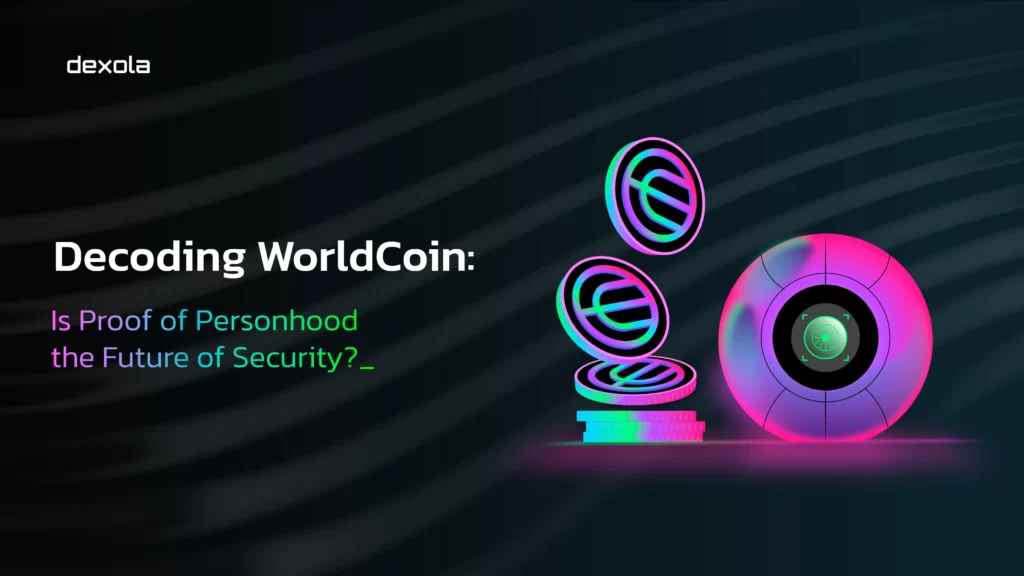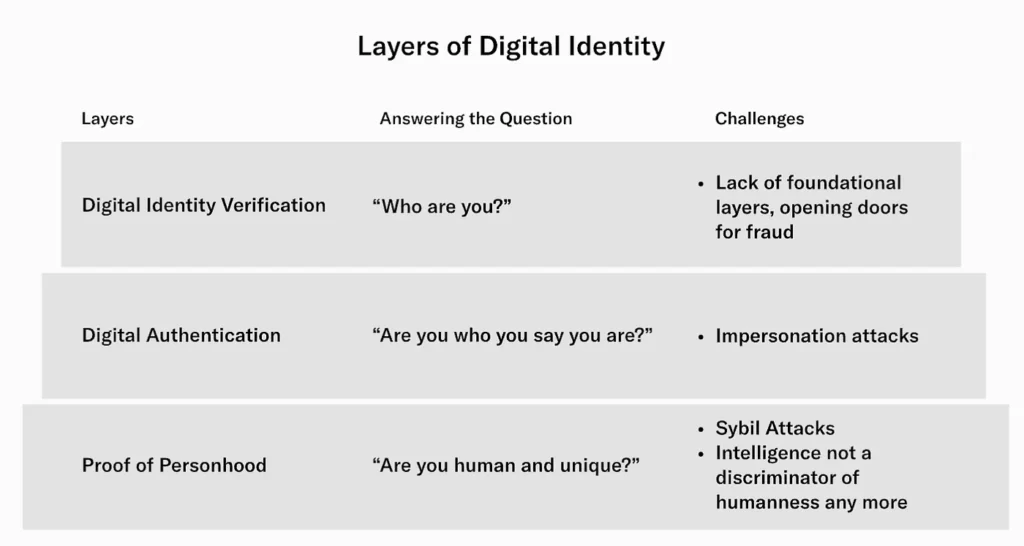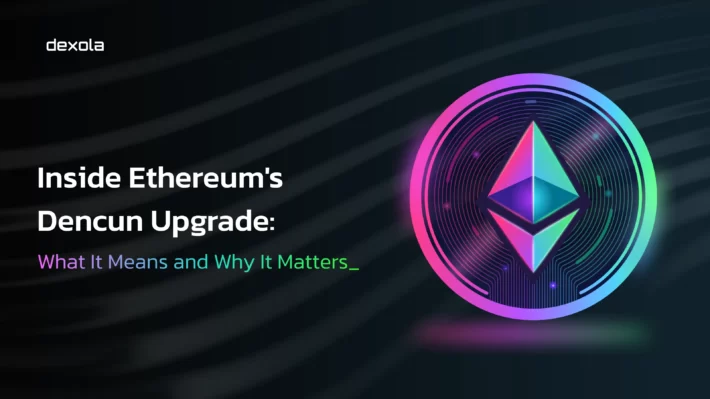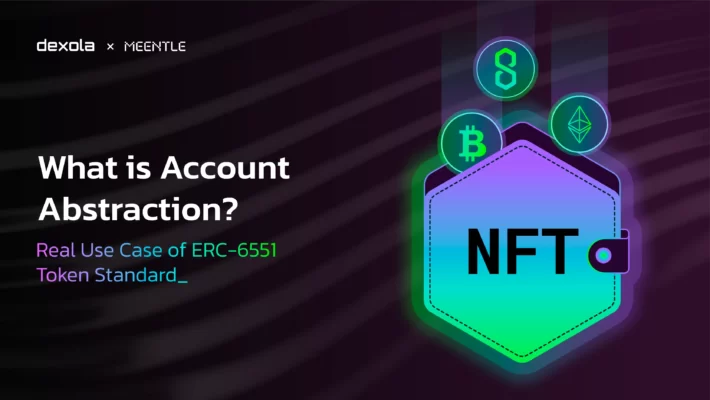Decoding WorldCoin: Is Proof of Personhood the Future of Security?

In the digital age, secure authentication is crucial for keeping the online world safe. Traditional methods like passwords and two-factor authentication often fall short in protecting users from cyber-attacks and identity theft. This has led to the exploration of new approaches, including Proof of Personhood (PoP).
What is Proof of Personhood?
As AI continues to advance, distinguishing humans from AI activity becomes essential. Proof of Personhood addresses this challenge by verifying an individual’s “personhood” and uniqueness.
The approach has emerged due to the proliferation of fake accounts and deepfake technologies used for manipulation. PoP ensures equal participation and rewards for project members, unlike other consensus mechanisms.
Unlike traditional authentication methods that rely on passwords or biometrics, Proof of Personhood establishes a user’s humanness through various techniques, such as social connections or Zero-Knowledge Proofs. This introduces new concerns, such as:
- Guarding against Sybil Attacks: Preventing a single attacker from creating multiple pseudonymous identities to launch online attacks.
- Halting the spread of AI-generated content: Preventing the dissemination of deceptive or misleading information on a large scale.

Vulnerabilities of PoP
Another major concern and challenge with switching to Proof of Personhood is personal information privacy. For example, facial recognition technology demands strict data processing protocols and user consent. Enhancing the accuracy and reliability of facial recognition algorithms is also critical.
For the technology to gain global acceptance, companies need to cooperate internationally and create regulatory frameworks to govern data usage. Training and educating both users and developers is also crucial for building confidence and encouraging the adoption of PoP, as the biggest challenge of the approach is lack of trust in this technology.
Building trust requires transparency, stringent data protection measures, and continuous dialogue with the public to address their concerns and demonstrate the benefits of PoP.
Potential Benefits of Proof of Personhood
Proof of Personhood raises suspicions regarding potential fraud. Legitimate organizations typically verify identity via email, phone, or a verification code. The term “Proof of Personhood” lacks a clear definition, leaving uncertainty about scammers’ motives, likely seeking personal data for theft.
Despite concerns, Proof of Personhood offers benefits:
- It enhances security by reducing phishing attacks and fake accounts.
- It offers protection against data theft, requiring identity proof for access.
- It combats cyberbullying by reducing anonymity and holding users accountable for their actions.
Overall, while raising concerns, Proof of Personhood improves security and accountability online. It creates a fairer online environment by reducing bots and fake accounts, leading to more honest and authentic communication. Increasing trust in online platforms, PoP can upgrade user confidence in online services.
Use Cases of PoP
Proof of Personhood can revolutionize many aspects of online life:
- Identification on the Blockchain: Serving as a universal digital identity for accessing various blockchain services and applications.
- Access to DeFi platforms: Providing a secure way to verify identity for users participating in DeFi protocols.
- NFT ownership: Confirming ownership of NFTs, reducing fraud risks, and bringing transparency to the digital collectibles market.
- Access to decentralized applications (DApps): Eliminating the need for multiple accounts and passwords.
- Decentralized Finance (DeFi): Enabling secure user adoption on DeFi platforms, improving financial inclusion and accessibility.
- Elimination of KYC/AML: Fulfilling KYC/AML requirements in DeFi platforms while maintaining user privacy.
- Preventing multiple registrations: Identifying and blocking users creating multiple accounts to earn bonuses or bypass restrictions.
- Improving credit scoring: Creating decentralized credit histories, allowing more accurate creditworthiness assessments.
- DAO Voting: Providing a secure way to vote in decentralized autonomous organizations, preventing fraud, and strengthening democratic participation.
PoP is a tool that can change many aspects of online life.
WorldCoin Identity Verification Approach
WorldCoin is a project aimed at changing the approach to identity verification using PoP. Developed by Tools for Humanity (TFH), a company founded by OpenAI CEO Sam Altman and Alex Blania, who serves as the CEO of TFH, WorldCoin consists of:
- World ID: A digital identifier necessary for confirming the reality and uniqueness of a person.
- World App: An application for making purchases and financial transfers using digital assets and fiat currencies.
- Worldcoin (WLD): A token providing voting rights for project development decisions.
Worldcoin identifies users by scanning the iris using a biometric device called an “orb.” The privacy of biometric data is ensured by zero-knowledge cryptography.
In the future, TFH plans to transfer the rights to the Worldcoin brand and related protocol technologies to the non-profit Worldcoin Foundation, registered in the Cayman Islands with a branch in the British Virgin Islands. This foundation will support the ecosystem and collaborate with TFH and other developers directly or through grants.
The code for the Worldcoin protocol and hardware is open-source and available on GitHub.
How Does Worldcoin Work?
Worldcoin operates on three key components: World ID, World App, and the WLD cryptocurrency token.
World ID
World ID is central to the platform, allowing users to verify their humanness online while keeping their privacy intact. An iris-scanning device called the Orb creates a unique IrisCode for each user, which isn’t linked to personal information. After scanning, the Orb issues a World ID and deletes the iris image. These IDs are added to the Worldcoin blockchain, and users verify themselves using a secure app. Worldcoin Orbs are available in major cities worldwide.
World App
The World App stores your World ID and serves as a crypto wallet. It protects user privacy and provides access to decentralized finance applications. The app can hold Bitcoin, Ethereum, USDC, and more cryptocurrencies in the future.
WLD Cryptocurrency Token
Users with a World ID and the World App can access the WLD token. Initially issued during the beta program, WLD is now traded on exchanges like KuCoin and Binance. Worldcoin plans to issue 10 billion WLD over 15 years, with 143 million currently in circulation.
Concerns Surrounding Worldcoin
Worldcoin has faced significant criticism for its ambitious goals and questionable methods.
Ethereum founder Vitalik Buterin expressed concerns that the platform’s iris scans might collect more data than disclosed or could be misused to verify World IDs. An MIT Technology Review article accused Worldcoin of deceptive marketing, excessive data collection, and lacking informed consent. Worldcoin responded, stating they are only interested in user uniqueness, not identity.
The platform has also been criticized for promoting heavily in developing countries, raising exploitation concerns. Crypto influencer ZachXBT highlighted the issue of boasting about user numbers while exploiting people in these regions. Additionally, Worldcoin received funding from Sam Bankman-Fried, founder of the failed crypto exchange FTX.
Key Takeaways
Proof of Personhood (PoP), as showcased by WorldCoin, introduces a revolutionary way to authenticate identity online, steering clear of the limitations inherent in traditional methods like passwords. This approach promises enhanced security against cyber threats and fraud by validating the uniqueness of each individual.
For emerging web tech startups seeking to explore integrations like PoP, we at Dexola can serve as your experienced technical partner. Our expertise and agile approach will navigate the complexities of your business.


